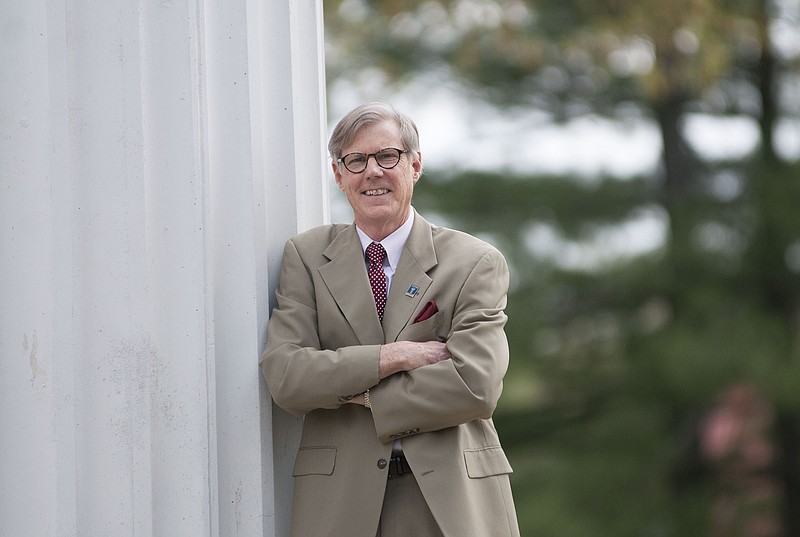Westminster College President Barney Forsythe describes his time as president as a highlight in his career.
"I never anticipated being a college president. I've enjoyed being able to serve this school and this community. I've probably learned more than I've taught about it. That's been the most rewarding and satisfying part of my 45-year career," Forsythe said. "Rewarding and satisfying mostly because of the opportunity to work with great people and to see lives changed."
Being in education, he said, has been a privilege. Teaching, he added, is an act of leadership that transforms the lives of others.
Forsythe described leadership and globalization as areas of interest throughout his career. He was the U.S. Military Academy's vice dean for education for nine years. He also taught in the Department of Behavioral Science and Leadership at West Point and founded the Center for Leadership and Organizations Research, where he served as director until 1996. Throughout his career, he taught undergraduate and graduate courses in leadership, education, research methods and human development.
And, he lead the creation of a plan for a school in Afghanistan that would educate military officers, which he describes as another highlight of his career.
"Talk about an interesting, intellectual, educational, cross-cultural multidisciplinary opportunity, that was pretty amazing," Forsythe said.
After that experience, Forsythe returned to West Point, where he was teaching at the time. But he said he began to think about what was next.
Forsythe was on Westminster's board of trustees when a position opened up. He turned in an application and applied for jobs elsewhere, too. After spending a day at Westminster with faculty, staff and students for his on-campus interview, he said he was impressed.
"I totally fell in love with the place. I was wow'd by the faculty and staff that I met, I was wow'd by the students, we (my wife and I) liked the Fulton community and I was really impressed by Westminster's purpose, it's mission," Forsythe said.
He accepted a position as the Westminster senior vice president and dean of faculty in 2005.
"I was very excited about the potential here and thought that I could both learn a lot and bring some things to the table that could be helpful," Forsythe said.
At that time, Forsythe said the college was focusing more on the holistic student approach to learning and he said there was beginning to be an "international energy" on campus. The college was starting to attract international students, he said.
Forsythe said most of the credit for Westminster's international energy goes to Pat Kirby, now the college's international recruiter. The college made a connection with United World College and soon developed a "critical mass" of international students, he said.
"Our approach here has been to assemble an international community," Forsythe said. "We try to recruit broadly so that we have 70 to 80 countries represented on campus."
Today, he said everyone lives in a global community and a global economy. He added that students should understand how interconnected the world is and that education has to be global.
"We thought it was important to assemble in the heartland, in this secure community like Fulton, essentially the United Nations, where we could live together and learn together and serve together and deal with all of the challenges you deal with in a global community," Forsythe said.
Those international students, he said, added perspective and help create a "rich environment for learning."
In October 2007, he served as acting president and in February 2008 was named the college's 20th president. In his decade at Westminster, Forsythe said he feels good about many enhancements he has seen the school make, adding that Westminster's dedicated faculty and staff are to credit for the college's strengths - not him.
One highlight of his time at the college, he said, has been the concept for student development.
"We see every space as a classroom," Forsythe said.
There are learning opportunities, he said, in a traditional lecture hall, student organizations and off-campus community involvement. That concept of student development, Forsythe said, has created opportunities like the Westminster Undergraduate Scholars Forum; the Hancock Symposium; take a friend home program, in which international students take a U.S. student home for the summer on the college's dime; service learning growth and an increasingly interdisciplinary curriculum.
Forsythe said that while his background in assessment and curriculum expertise have been useful for the college in his tenure there, he also said a different type of expertise is needed for the college in the future. Westminster, he said, is starting to work on new projects and programs that he described as responsive to workforce demands.
"We know where we need to go and we need to get someone in here with the experts to begin to do that," Forsythe said. "I came in with my expertise to do what I was charged to do and did it. And now we need someone to come in who has some expertise in opening up new kinds of programs that are not just residential undergraduate programs."
Forsythe will retire at the end of this school year. He and his wife Jane plan to move to a small town in South Carolina and to spend more time with their two children and three grandchildren.

